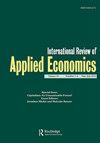Greenhouse gas emissions from Brazilian agriculture and convergence clubs
IF 1.6
Q3 ECONOMICS
引用次数: 0
Abstract
ABSTRACT This work aims to assess whether there is a convergence in the emission of Greenhouse Gases (GHG) in the states of Brazil. To achieve this objective, the Phillips and Sul (2007) time series methodology was employed, testing the hypothesis of global (or common) convergence, using data from the Greenhouse Gas Emissions and Removal Estimation System (Sistema de Estimativas de Emissões e Remoções de Gases do Efeito Estufa - SEEG), for the period of 1989–2018, which provides the emission, in tons, of Carbon Monoxide (CO) in agriculture and livestock, as well as of Carbon Dioxide (CO2), for changes in land and forest use. Among the main results, the formation of different convergence clubs is suggested, rejecting the hypothesis of global convergence, and thus presenting four convergence clubs for the CO pollutant and three clubs for the CO2, with two divergent states. When analysing the convergence clubs, it was found that there was a significant reduction in CO emissions in all clubs, and while analysing the CO2, only two of the clubs, which were clubs 3 and 4, managed to reduce their emissions.巴西农业和收敛俱乐部的温室气体排放
本研究旨在评估巴西各州温室气体(GHG)排放是否存在趋同。为了实现这一目标,采用了Phillips和Sul(2007)时间序列方法,使用1989-2018年期间温室气体排放和清除估计系统(Sistema de Estimativas de Emissões e Remoções de Gases do Efeito Estufa - SEEG)的数据,测试了全球(或共同)收敛的假设,该系统提供了以吨为单位的农业和畜牧业中一氧化碳(CO)的排放量,以及二氧化碳(CO2)。土地和森林利用的变化。在主要结果中,提出了不同收敛俱乐部的形成,拒绝了全球收敛的假设,从而出现了CO污染物的4个收敛俱乐部和CO2的3个收敛俱乐部,具有两种不同的状态。在分析趋同俱乐部时,发现所有俱乐部的CO排放量都有显著减少,而在分析CO2时,只有两个俱乐部,即俱乐部3和4,设法减少了排放。
本文章由计算机程序翻译,如有差异,请以英文原文为准。
求助全文
约1分钟内获得全文
求助全文
来源期刊

International Review of Applied Economics
ECONOMICS-
CiteScore
4.30
自引率
4.50%
发文量
37
期刊介绍:
International Review of Applied Economics is devoted to the practical applications of economic ideas. Applied economics is widely interpreted to embrace empirical work and the application of economics to the evaluation and development of economic policies. The interaction between empirical work and economic policy is an important feature of the journal. The Journal is peer reviewed and international in scope. Articles that draw lessons from the experience of one country for the benefit of others, or that seek to make cross-country comparisons are particularly welcomed. Contributions which discuss policy issues from theoretical positions neglected in other journals are also encouraged.
 求助内容:
求助内容: 应助结果提醒方式:
应助结果提醒方式:


